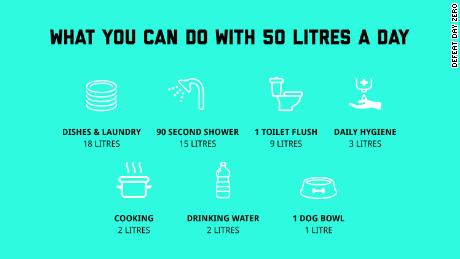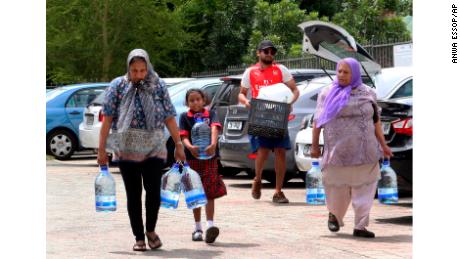City officials had recently said that day would come on April 22. This week, they moved up the date to April 12. Cape Town is South Africa's second-largest city and a top international tourist draw. Now, residents play a new and delicate game of water math each day. They're recycling bath water to help flush toilets. They're being told to limit showers to 90 seconds. And hand sanitizer, once somewhat of an afterthought, is now a big seller. "Unwashed hair is now a sign of social responsibility," resident Darryn Ten told CNN.
The genesis of the crisis
So how did this happen? How does a major city in the developed world just run dry? It's been a slow-motion crisis, exacerbated by three factors:
- The worst drought in more than a century, which has pushed Cape Town's water scarcity into a potentially deadly horizon
- The metro area's population, which is4 million and growing quickly.
- A rapidly changing climate.
Even with the predicament they find themselves in, residents haven't dropped their water use significantly, Cape Town Mayor Patricia de Lille said. The city has lowered the water pressure in its mains to help stretch the water supply. But usage is still 86 million liters above its target goal."It is quite unbelievable that a majority of people do not seem to care and are sending all of us headlong towards Day Zero," a statement from the mayor's office said. "We can no longer ask people to stop wasting water. We must force them."Starting February 1, residents will only be allowed to use 50 liters, or a little over 13 gallons, of water per person, per day. 
Coping with the shortage
The shortage is forcing some residents to get creative.Alistair Coy, who's vacationing in Cape Town from the United Kingdom, strains the water that's left over from boiling potatoes into a bucket. Many residents are reusing bucket water, such as Anne Verbist, who recycles her tap water to tend to her plants."We catch all water from the tap to wash hands and dishes and use it for the plants," she said. But creativity is also creating problems."People (are) buying anything that can hold water," resident Richard Stubbs said. "No buckets, no (gas cans) or drums (are) in stock. So people (are) buying bins, vases and large storage boxes." Some then fill up these containers with water from the city supplies — further feeding the crisis.
Worries about drinking water
Verbist and some other residents said that while they use tap water for household needs, they are reluctant to drink it."They claim it is fine to drink, but the kids were having tummy issues," she said. So now, she and her family trek to the Newlands Spring to get their allotted liters of water twice a month. They tried to replenish their drinking water reserves Monday, but the line was too long. They went back the next day. Lincoln Mzwakali said his tap water "tastes funny" as well, so he relies on the spring."Many neighboring communities have started depending on it," he said.CNN asked the city of Cape Town about the water quality concerns that some residents reported but has not received a response.
Long lines and bare essentials
It's not lost on residents that "Day Zero" is fast approaching. "It's frightening, especially when you actually see the dams where we get our water from," Verbist said. Water levels at dams supplying the city have dropped 1.4% in the last week, and video taken Tuesday of the city's largest dam, Theewaterskloof, shows an almost-barren reservoir bed.Some who have money to leave Cape Town until the crisis subsides are doing so. Darryn Ten plans on doing just that."Basically, everyone I know who is in the position to be able to leave is doing so," he said. "The consensus is that everyone who can get out of town should do so in order to help lessen the burden." But there are those who can't — the elderly, disabled and the impoverished. "They don't have the money to buy water," Verbist told CNN. "It's been a hard transition because a lot of Capetonians aren't understanding how we got to this point when the municipality was well-informed that we would experience a drought," Mzwakali said. "There are a lot of angry people and not enough answers on how this is going to be resolved."
Original Article
[contf] [contfnew] 
CNN
[contfnewc] [contfnewc]








